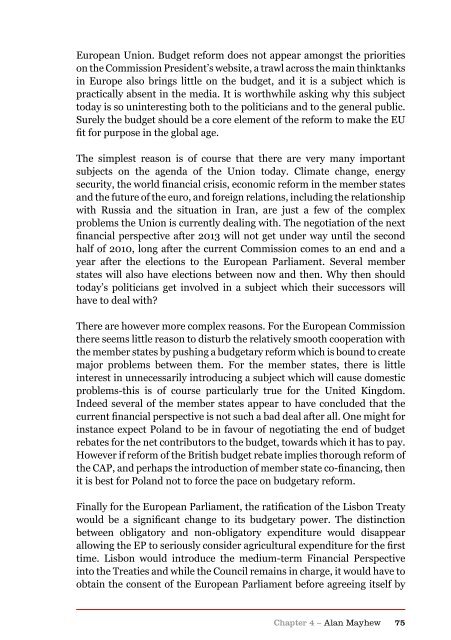Authors Iain Begg | Gabriel Glöckler | Anke Hassel ... - The Europaeum
Authors Iain Begg | Gabriel Glöckler | Anke Hassel ... - The Europaeum
Authors Iain Begg | Gabriel Glöckler | Anke Hassel ... - The Europaeum
You also want an ePaper? Increase the reach of your titles
YUMPU automatically turns print PDFs into web optimized ePapers that Google loves.
European Union. Budget reform does not appear amongst the priorities<br />
on the Commission President’s website, a trawl across the main thinktanks<br />
in Europe also brings little on the budget, and it is a subject which is<br />
practically absent in the media. It is worthwhile asking why this subject<br />
today is so uninteresting both to the politicians and to the general public.<br />
Surely the budget should be a core element of the reform to make the EU<br />
fit for purpose in the global age.<br />
<strong>The</strong> simplest reason is of course that there are very many important<br />
subjects on the agenda of the Union today. Climate change, energy<br />
security, the world financial crisis, economic reform in the member states<br />
and the future of the euro, and foreign relations, including the relationship<br />
with Russia and the situation in Iran, are just a few of the complex<br />
problems the Union is currently dealing with. <strong>The</strong> negotiation of the next<br />
financial perspective after 2013 will not get under way until the second<br />
half of 2010, long after the current Commission comes to an end and a<br />
year after the elections to the European Parliament. Several member<br />
states will also have elections between now and then. Why then should<br />
today’s politicians get involved in a subject which their successors will<br />
have to deal with?<br />
<strong>The</strong>re are however more complex reasons. For the European Commission<br />
there seems little reason to disturb the relatively smooth cooperation with<br />
the member states by pushing a budgetary reform which is bound to create<br />
major problems between them. For the member states, there is little<br />
interest in unnecessarily introducing a subject which will cause domestic<br />
problems-this is of course particularly true for the United Kingdom.<br />
Indeed several of the member states appear to have concluded that the<br />
current financial perspective is not such a bad deal after all. One might for<br />
instance expect Poland to be in favour of negotiating the end of budget<br />
rebates for the net contributors to the budget, towards which it has to pay.<br />
However if reform of the British budget rebate implies thorough reform of<br />
the CAP, and perhaps the introduction of member state co-financing, then<br />
it is best for Poland not to force the pace on budgetary reform.<br />
Finally for the European Parliament, the ratification of the Lisbon Treaty<br />
would be a significant change to its budgetary power. <strong>The</strong> distinction<br />
between obligatory and non-obligatory expenditure would disappear<br />
allowing the EP to seriously consider agricultural expenditure for the first<br />
time. Lisbon would introduce the medium-term Financial Perspective<br />
into the Treaties and while the Council remains in charge, it would have to<br />
obtain the consent of the European Parliament before agreeing itself by<br />
Chapter 4 – Alan Mayhew 75

















